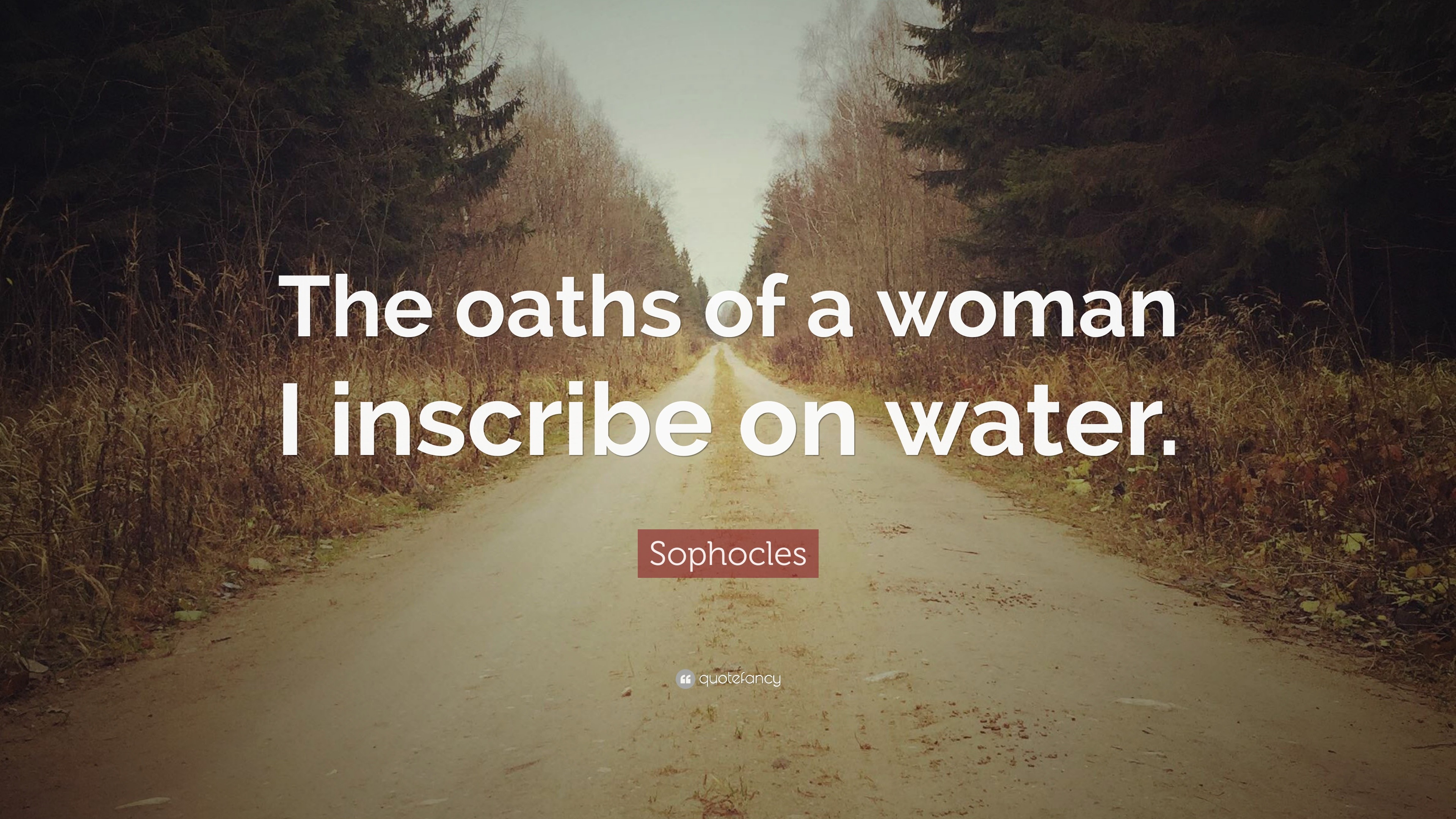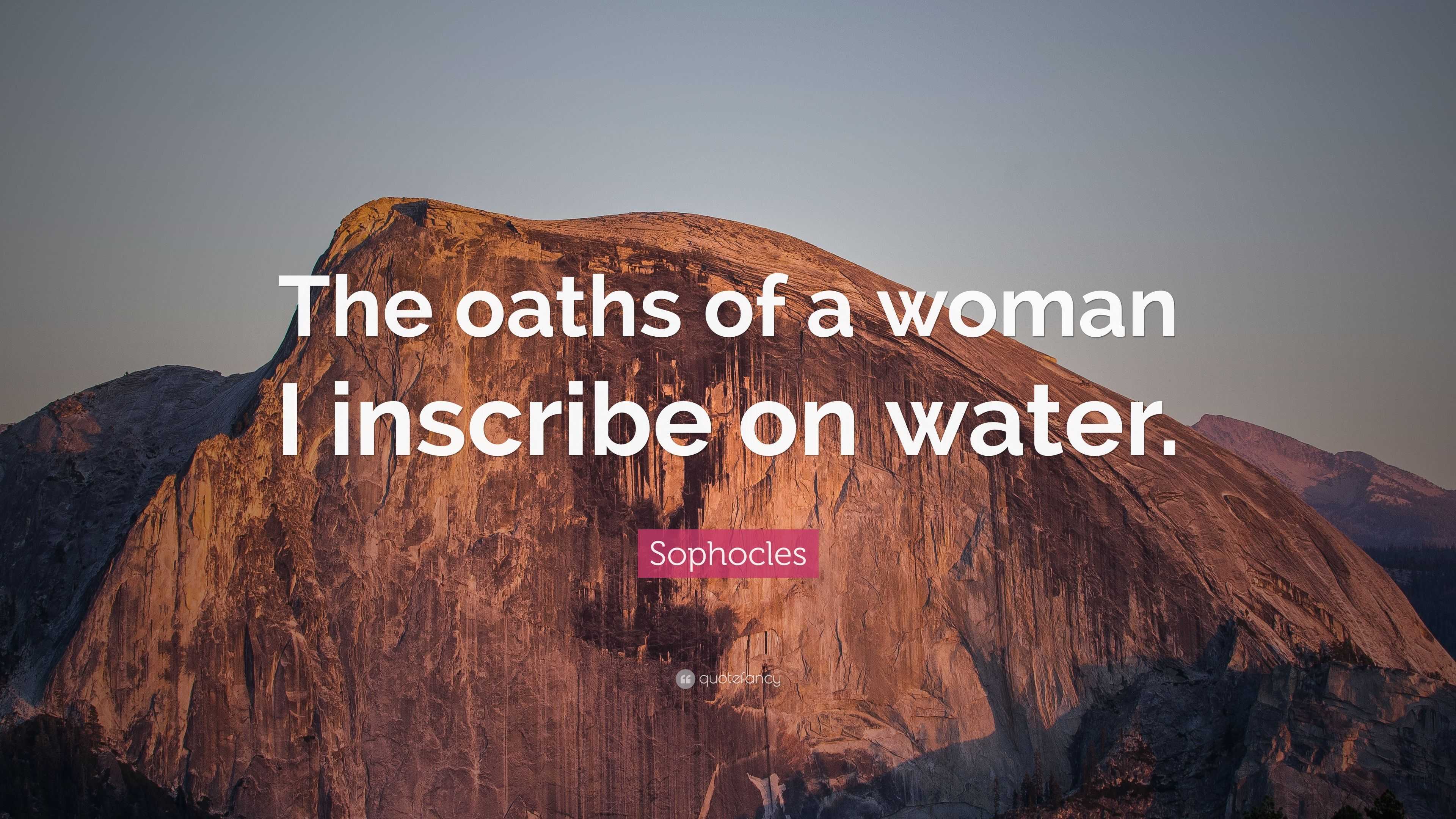There’s something undeniably magnetic about the phrase "the oaths of a woman I inscribe on water." It’s poetic, haunting, and yet so deeply human. At first glance, it feels like a riddle—a delicate dance of words that invites you to dive deeper into its layers. But what does it really mean? Is it a metaphor for fleeting promises, the fragility of human connection, or perhaps a reflection of our own impermanence? Stick around, because we’re about to unravel this enigma together.
Let’s face it, life is full of oaths—promises we make to ourselves, to others, and sometimes even to the universe. Some stick, others fade like ink spilled on a restless sea. The phrase "the oaths of a woman I inscribe on water" taps into that universal truth. It reminds us that not all commitments are meant to last, and that’s okay. In fact, it’s part of the beauty of being human. So, buckle up, because we’re about to explore the depths of this poetic masterpiece.
This isn’t just a random phrase plucked from the ether. It’s a call to introspection, a reminder of the power—and limits—of our words. Whether you’re here to find meaning, inspiration, or just a good old-fashioned brain-teaser, you’re in the right place. Let’s get started, shall we?
- Brian Campbell Death Unraveling The Truth Behind The Headlines
- Is Luke Combs A Conservative The Truth Behind His Political Views And Beliefs
Understanding the Phrase: What Are These Oaths?
Alright, let’s break it down. The phrase "the oaths of a woman I inscribe on water" is steeped in symbolism. On the surface, it talks about promises—oaths, if you will—that a woman makes or receives. But here’s the kicker: they’re written on water. Think about it. Water is fluid, ever-changing, and impossible to hold onto. It’s a powerful metaphor for impermanence, reminding us that not everything we say or do is set in stone.
Exploring the Symbolism Behind Water
Water has been a symbol of life, change, and renewal across cultures and centuries. In this context, it represents the transient nature of our words and actions. When you inscribe something on water, it’s bound to disappear, much like the promises we make that fade with time. It’s a humbling reminder that our words, no matter how sincere, aren’t always permanent.
The Role of Gender: Why a Woman?
Now, here’s where things get interesting. Why specify "a woman"? Could it be a nod to the historical and cultural roles women have played as keepers of tradition, wisdom, and sometimes, even secrets? Or is it simply a poetic choice to add depth to the phrase? Let’s explore.
- Morgan Ingram Mom The Story Of Strength Love And Resilience
- Kourtney Kardashian Ring The Ultimate Guide To Her Sparkling Jewelry Collection
Cultural Perspectives on Women and Promises
In many cultures, women have been seen as the backbone of families and communities. They’re often the ones holding things together with promises, oaths, and unwavering dedication. But what happens when those promises can’t be kept? The phrase "the oaths of a woman I inscribe on water" acknowledges the complexity of this role, celebrating both the strength and vulnerability that come with it.
The Power of Impermanence
Impermanence is a tough pill to swallow, but it’s also one of life’s greatest teachers. The idea of inscribing oaths on water forces us to confront the fleeting nature of our commitments. It’s a reminder that sometimes, letting go is the most powerful thing we can do.
Why Impermanence Matters
Think about it. How many promises have you made in your life that you couldn’t keep? How many have others made to you that didn’t pan out? Impermanence teaches us to live in the present, to cherish the moments we have, and to let go of the ones that no longer serve us. It’s a lesson in resilience, adaptability, and self-awareness.
Historical and Literary Context
Phrases like "the oaths of a woman I inscribe on water" don’t exist in a vacuum. They’re often rooted in historical and literary traditions that give them depth and meaning. Let’s take a closer look at where this phrase might have come from.
Roots in Poetry and Prose
Many literary works explore the theme of impermanence through metaphors like water and writing. From ancient epics to modern poetry, the idea of words fading like ink on water resonates across time and space. It’s a universal truth that transcends borders and cultures, reminding us of our shared humanity.
Personal Reflections: What Do These Oaths Mean to You?
At the end of the day, the meaning of "the oaths of a woman I inscribe on water" is deeply personal. It’s about your own experiences, your own promises, and your own journey. Let’s dive into some reflections that might resonate with you.
Key Questions to Consider
- What promises have you made that felt impossible to keep?
- How do you feel about the impermanence of your words and actions?
- What lessons have you learned from letting go of unfulfilled oaths?
Psychological Insights: The Science of Promises
Believe it or not, there’s a whole field of psychology dedicated to understanding why we make promises and why we sometimes break them. Let’s explore some key insights that shed light on this fascinating topic.
Why We Break Promises
It’s not always about malintent. Sometimes, life gets in the way. Other times, we simply don’t have the resources to keep every promise we make. Understanding the psychology behind broken promises can help us approach them with more empathy and compassion.
Cultural Implications: How Different Societies View Oaths
Cultures around the world have unique perspectives on promises and oaths. Some view them as sacred, while others see them as flexible guidelines. Let’s take a look at how different societies interpret this concept.
Case Studies from Around the World
- In Japan, promises are often seen as binding commitments that reflect one’s honor.
- In Western cultures, there’s more room for flexibility, especially in informal settings.
- In Indigenous communities, oaths are often tied to spiritual beliefs and ancestral traditions.
Modern Applications: Lessons for Today’s World
So, how can we apply the wisdom of "the oaths of a woman I inscribe on water" to our modern lives? Whether you’re navigating relationships, career choices, or personal growth, this phrase has something to teach you.
Practical Tips for Embracing Impermanence
- Set realistic expectations for yourself and others.
- Practice mindfulness and live in the present moment.
- Learn to let go of things that no longer serve you.
Conclusion: Embracing the Beauty of Transience
As we wrap up our exploration of "the oaths of a woman I inscribe on water," one thing becomes clear: life is full of promises, but not all of them are meant to last. And that’s okay. The beauty of this phrase lies in its acknowledgment of impermanence and the lessons it teaches us about resilience, adaptability, and self-awareness.
So, what’s next? Take a moment to reflect on your own oaths. Which ones are worth holding onto, and which ones are better left to fade like ink on water? Share your thoughts in the comments below, and don’t forget to check out our other articles for more insights into the human experience.
Table of Contents
- Understanding the Phrase: What Are These Oaths?
- Exploring the Symbolism Behind Water
- The Role of Gender: Why a Woman?
- Cultural Perspectives on Women and Promises
- The Power of Impermanence
- Why Impermanence Matters
- Historical and Literary Context
- Roots in Poetry and Prose
- Personal Reflections: What Do These Oaths Mean to You?
- Key Questions to Consider
- Psychological Insights: The Science of Promises
- Why We Break Promises
- Billy Wayne Smith The Untold Story Of A Man Who Shaped Modern Justice
- Lil Wayne Las Vegas Residency The Hottest Show In Sin City


